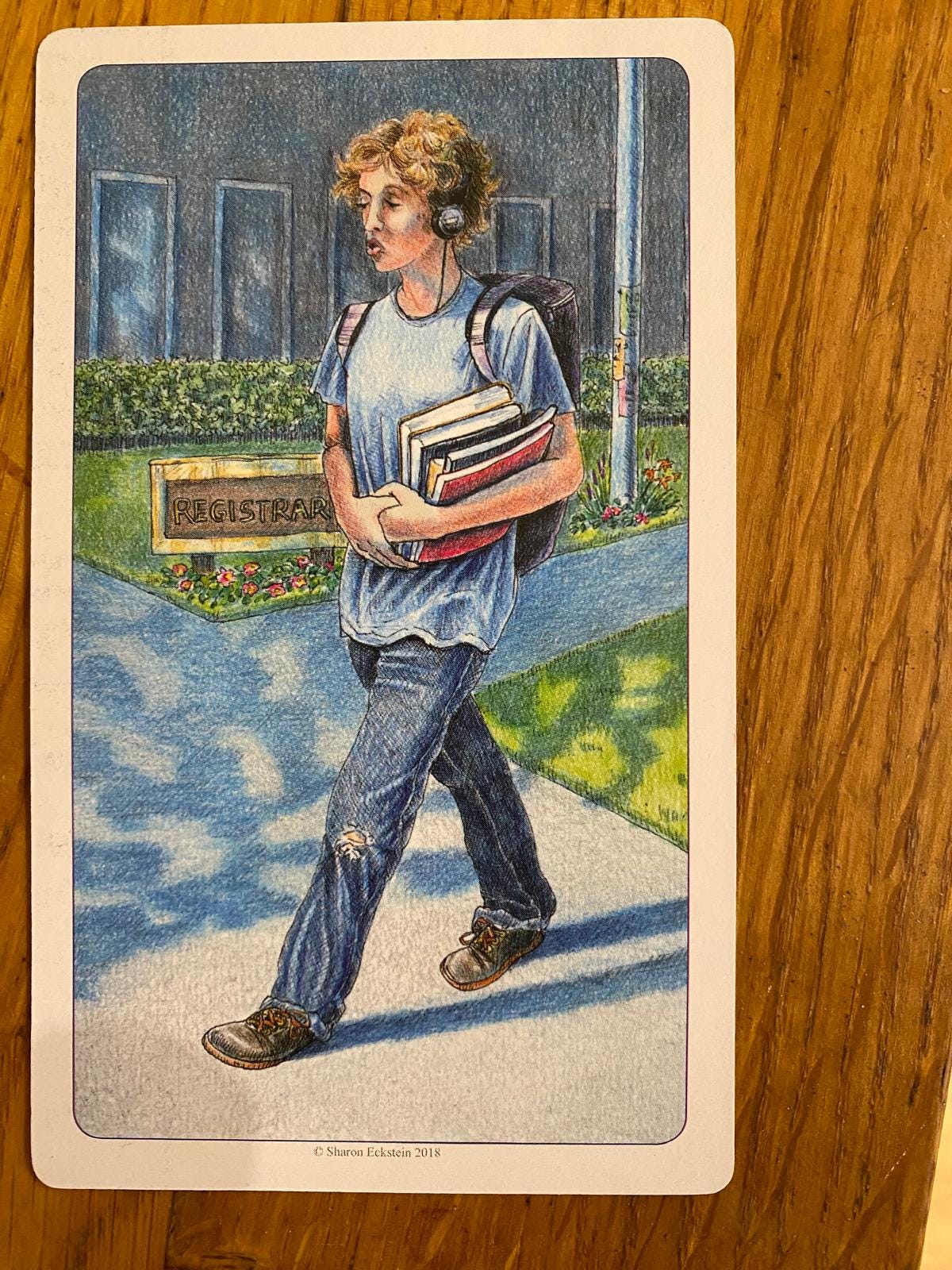Meeting My Managers and Exiles at Our Climate-Conflicted Workshop
How Steffi Bednarek's genius for Internal Family Systems cast my story in a new light.
If you liked reading this, feel free to click the ❤️ button on this post so more people can discover it on Substack 🙏

Resonant World #121
In February, I wrote about psychologist Steffi Bednarek’s work to help us make sense of our often contradictory responses to climate breakdown using the Internal Family Systems model of therapy, developed by Richard Schwartz. (Resonant World#65: A New Lens on the Climate Crisis).
On Saturday, I experienced this work for myself, at a workshop Steffi and I co-facilitated to support professionals conflicted over their organisation’s relationship to the crisis.
Though I knew Steffi’s work would be powerful, I was surprised at how much I learned by coming into contact with a younger part of myself that I don’t normally have much of a conscious connection with — my Diligent Student.
To recap, Internal Family Systems, or IFS, is based on the idea that we’re all made up of many parts — like sub-personalities — who are constantly vying to control what we think, say and do.
Our Manager parts are intent on keeping us safe by maintaining our standing in society, and playing by the rules at work. Unsurprisingly, our Managers are in a state of perpetual guerrilla war with our Exiles — the rebellious, aggrieved, ashamed, outraged, scared, exuberant, creative, sexually adventurous and other parts of ourselves that we’ve been taught to repress.
If our Managers work hard enough, we may imagine that we’ve rid ourselves of these unwelcome parts for good. But these rejected sub-personalities don’t just disappear. They wait patiently — in exile — for their chance to stage a palace coup, often when we’re feeling overwhelmed, conflicted or challenged in some way.
An example of this would be a situation where we want to speak up at work — but one of our Manager parts steps in to ensure that we don’t rock the boat. Or we might feel flooded with anxiety that renders us mute midway through the meeting — that’s an Exiled child part, who’s terrified of disapproval from the authority figures in the room.
These parts take over without us even realising — we just assume “that’s how I am.” But by working to identify and build relationships with our parts (and there’s lots of them), we can grow our capacity to respond from a wiser, non-reactive part of ourselves — what in IFS is termed Self.
Morphed Into a Manager
Steffi spread a pack of cards representing possible different parts over the floor and asked us each to pick a Manager and an Exile. The cards she uses are suitably evocative sketches of characters representing 70 archetypes; stern judge, ruler-wielding schoolmarm, marathon runner, hospital patient, artistic girl, triumphant warrior, teacher’s pet, and many more besides.
I picked a card showing a student walking past the registrar’s office, arms laden with books. I instantly recognised my Diligent Student — a part that had been almost excruciatingly conscientious from probably the age of about seven or eight — and maintained an adamantine commitment to scoring top grades throughout school and university. (The exception being subjects I found hard, like maths or economics, which I gave up — or deliberately flunked, to avoid facing the intolerable feeling of shame I might suffer if I made an earnest attempt and still didn’t excel).
I was surprised to recognise how my Diligent Student had continued to function well past the end of my formal education, morphing into a fully-fledged Manager part that had run much of my career — often to good effect.
The Diligent Student had been particularly active while I was working at big media organisations, when he had repeated his winning formula from the education system — striving to be recognised as one of the “good ones” by doing all he could to impress the authorities, who had transmogrified from teachers into editors. This worked out pretty comfortably for me for years; I loved my journalism jobs, and did well at them. Diligent Student was mostly satisfied — even if his gnawing fears about what might happen if he ended up flunking a reporting assignment, rather than an exam, generated a low-level anxiety that never quite went away.1
The lightning bolt moment for me was when Steffi invited us to ask our Manager part how old it thought we were now. Diligent Student answered without hesitation: 22.2
I was stunned.
This Manager part had been doing its best to keep me safe within a framework that had worked fine for my 22-year-old self — but which was now decades out of date.
This realisation helped me to see more clearly what had been going on in my previous job at Reuters news agency, where my short-lived assignment as climate correspondent had ultimately led me to resign from a company I’d once loved. I’d since worked with colleagues at DeSmog and Drilled to document the company’s millions of dollars of oil and gas sponsorship deals, and publicly called on Reuters editor-in-chief Alessandra Galloni, who must approve such commercial ventures, to veto them.3 Diligent Student had no doubt been left wearing a rictus grin, but for a time, at least, my manager parts had ceded the field. (Survival Tool#38: Reflect on Your Life’s Larger Themes).
Emperor’s New Clothes
I can now see that Diligent Student had served me well as long as I was writing about subjects that didn’t encroach on territory occupied by any of my exiled parts. But when I began working as a climate correspondent, this Manager part had come into contention with an exile who would not give up easily.
A few days before I officially took up the role in April, 2019, I had come into contact with an overwhelming feeling of grief at the magnitude of the manmade catastrophe afflicting the natural world, during a climate conference in Findhorn, Scotland. With hindsight, I can recognise that this primal experience of heartbreak marked the moment when I began to bring a part I’ll call Nature-Loving Little Boy home from exile — having banished him many years previously to satisfy my Thrill-Seeking Journalist part’s desire to run around in war zones.
Heartbroken and traumatised upon immersing myself in the stark reality of climate and ecological collapse, as my climate job at Reuters demanded, Nature-Loving Little Boy was simply not willing to conform with any system that said it cared about these crises, but acted in a way that demonstrated the contrary. (Our DeSmog-Drilled report laid bare Reuters’ lucrative romance with oil companies — showing how the sheer breadth and depth of its fossil fuel commercial deals eclipsed all other major legacy media. Reuters’ enthusiasm for hosting monster oil and gas trade shows in Houston, or making pathetic greenwashy podcasts for Saudi Aramco, rather than directing its formidable journalistic firepower to holding the industry to account, would be other examples of such contradictions, in my view). (Resonant World#32: Processing My Reuters Climate Karma).
Faced with Nature-Loving Little Boy’s anger and disgust, Diligent Student didn’t stand a chance.
By the time of this Manager-Exile showdown, I’d also had an opportunity to build more psychospiritual “ground” for myself to stand on than my 22-year-old self — ground that didn’t depend upon winning a gold star from teachers, or anyone with “editor” on their business card.
Much of this ground had been forged the hard way — bouts of depression through my 20s, 30s and early 40s had forced me to seek a more durable sense of selfhood than I could find by staking my psychic integrity on the ups and downs of career, or conventional definitions of “success.” Therapy; meditation; sweat lodges; men’s work; plant medicines; shamanic practices; breathwork — the list sounds like an orgy of New Age clichés; and yet each of these modalities played important roles in helping me outgrow the fears and preoccupations of my Diligent Student, and his 22-year-old worldview.
Subsequent exploration via the two-year Timeless Wisdom Training with Thomas Hübl and team, and my ongoing training as a collective trauma integration facilitator, would help me tap into even deeper wells of sustenance — and recognise how cut off I’d been from these multi-dimensional resources growing up.
This latter work has also helped me to see more clearly how — as the inheritor of the frozenness of generations of military combatants — I’d not had much early access to the soil of deep masculine groundedness that doesn’t depend on validation from a power-over hierarchy.
I notice now how my need for external validation has declined in direct proportion to my capacity to cultivate that kind of ground within myself. Writing this — and sharing it — is part of that continuous, daily practice. I’m also now fortunate to be working with
to guide other men towards that ground, and learn more from them about the many other paths for reaching it, via initiative. (Resonant World#120: Opening a Portal to the Authentic Self).Wise Man
For a while at Reuters a tenuous equilibrium held; my Diligent Student was productive and professional enough to satisfy the system that I was a loyal servant. But as time went by, the Nature-Loving Little Boy — just like the little boy in the fairy tale who saw that the Emperor was naked — couldn’t keep quiet. The contradictions between his employer’s stated concern about the climate crisis, and its actions, loomed too large.
When I left Reuters, no longer willing to be complicit, it wasn’t the act of a scared or petulant child. My resignation was a joint venture, between my Nature-Loving Little Boy, now home from exile, and the husband and father I’d become — overlit by the guidance of my Self; on good days, at least.
Quitting the company (for the third and final time) wasn’t an easy decision, nor one I took lightly. It came with significant costs — both in terms of salary and status, at least in the eyes of many of my former peers. But I felt better for knowing that me and my Nature-Loving Little Boy were walking hand-in-hand now. We’d come to a shared understanding of what was the right next step at each stage of the journey ahead. We’d check in with Self as often as we could. And we’d face what would come, together. (Survival Tool#42: Be Aware of your Host Organism).
The other card I chose during Steffi’s exercise surprised me, too.
For my Exiled part, my hand was drawn to a card depicting a wise old man, holding a shining lantern — much like the Hermit in the Major Arcana of the Tarot. (Resonant World#103: 101 Reasons Why You Need a Tarot Reading).

The image moved me.
What innate wisdom and subtle capacities had I sent into exile growing up because there’d been nowhere for them to land in my family or education system?
What possibilities might this wise old man illuminate, if I could welcome him in from the starry night, his lantern so bright — casting away the shadows?
I’m looking forward to finding out.
For more about Steffi Bednarek, please visit her website.
And we’ll be offering more climate-related events in 2025; stay tuned!
New From the Resonant Parenting Project:
Dr Genevieve, creator of the Resonant World’s sister publication The Resonant Parenting Project, is offering a four-week course, starting in January, to help parents struggling to manage the inevitable meltdowns, mood swings and difficulties with transitions (such as getting ready for school, bed time) experienced by their sensitive, strong-willed kids.
Genevieve has both an incredible intuitive ability to help parents tune in to what their sensitive kids need — and many years of experience working with hundreds of families as a clinical psychologist and conscious parenting coach.
If you’re finding you’re getting very triggered by your child, struggling to remain calm, and losing it on a regular basis (as I often have), then this course provides a combination of practical tools, community support and bespoke guidance that can rapidly help you establish a more harmonious equilibrium in your home. You can read more about Dr Genevieve here.
And you can follow Dr Genevieve’s posts here:
It’s a big boost when people become paid subscribers, and support of any amount energises my mission to serve the global movement to heal individual, ancestral and collective trauma. Thank you!
As it happens, I ended up flunking one of the biggest assignments of my journalistic career, but that’s a story for another day.
I have the tiniest suspicion that this number might have something to do with overexposure to the Taylor Swift song 22, by virtue of having a seven-year-old daughter. If so, we’ll just put that down to the ever-mysterious workings of synchronicity.
I have emailed Alessandra and various other members of her senior leaderhip team about these deals and never received any response.








Awesome sharing, Matthew. I love the participatory perspective with which you are reporting from the cutting edge of collective healing. All that "embedded journalism" trainings seems to have prepared you so well to share SO much now with so many! I know it doesn't pay as well as The Financial Times of London or Reuters, but on the scale of karma you are a billionaire, bro! Thanks for helping to bring Steffi's great work to light. I wish everyone, literally, would read the book she has curated. It is brilliant beyond words. And so are you!
Thanks so much for sharing, Matthew!
Two sentences resonate a 100% for me:
"What innate wisdom and subtle capacities had I sent into exile growing up because there’d been nowhere for them to land in my family or education system?"
Me, too.
And:
"What possibilities might this wise old man illuminate, if I could welcome him in from the starry night, his lantern so bright — casting away the shadows?"
Oh yes, those possibilities! Bringing back that exiled innate wisdom and those subtle capacities — the more of us who are able to do so, the better we might be able to handle the current polycrisis, shed the skin of our dysfunctioning extractive globalised power-over society and — raw, vulnerable and truly alive again — join in co-creating a joyful, loving, emergent, vibrant and abundant present in which all beings everywhere on this planet can thrive.